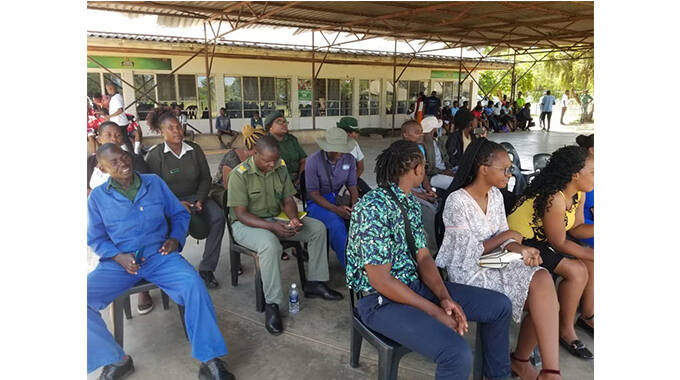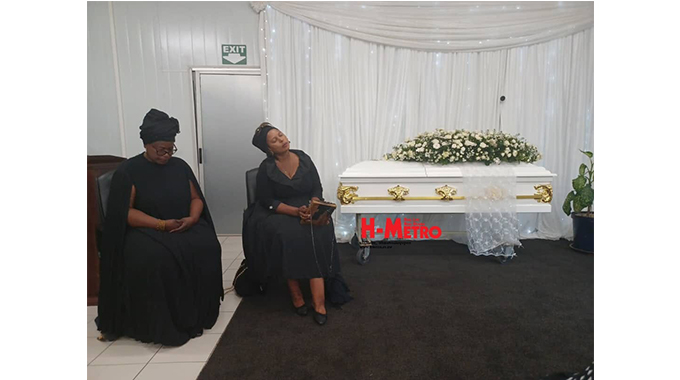A sad tale of a woman’s ‘escape’ from abusive husband to prison

Michael Magoronga, Midlands Correspondent
SHE wears a smile as she trudges towards the prison gate.
The smile is however a thin veil of anguish, anger and disappointment engraved in her soul.
She is a troubled woman who can’t comprehend the reason why she is languishing in prison.
Sofia Kutama (40) is among the few prisoners allowed to participate during commemorations to mark 16 days of Activism against Gender-based Violence (GBV) together with stakeholders from Kwekwe District, comprising Government departments and non-governmental organisations.
Soccer, netball, drama, music, dance and of course, food, were the order of the day as the stakeholders sought to bring awareness to inmates on GBV issues.
For Kutama, although she was present physically, her mind seemed to be far off.
After being granted permission to interview her by prison authorities at Kwekwe Prison, Kutama tells her harrowing story.
“I’m thinking of my children. I’m afraid that their father might abuse the girls, especially the eldest one since he’s staying with them in a single room,” she said as the conversation took off.
That alone leaves one wondering how such a caring mother found her way into prison.
She is serving a 10-month jail term for assaulting her husband and has now served six with expectations that she will complete her sentence next month.
She fought back tears as she narrated how her husband, whom she said was abusive, got her arrested and subsequently jailed.
Married for more than 15 years, Kutama and her husband have four children, two girls and two boys, with the eldest daughter aged 15.
What went wrong, one wonders.
“He simply lost love for me. The relationship became irretrievably broken and he wouldn’t eat my food, let alone talk to me. I don’t know what he was told by some traditional healers he had consulted,” said Kutama.
It started in October 2021 when she travelled to her rural home in Chimanimani.
Upon her return, she found that her husband had changed.
Her husband, she alleges, had been told by a traditional healer that she has a bad omen and he needed to get rid of her.
“He didn’t even talk to me and to make matters worse, he tried to convince our children that I was a bad woman. But my first-born daughter stood with me while the rest supported their father. It was a divided family yet we stayed together,” she narrated.
As things got worse, her husband was no longer buying food neither was he speaking to her so she decided to go back to her family to narrate her ordeal.
She stayed there for four months and upon her return, her daughter who supported her, had eloped.
“She was forced by circumstances. Her father always threatened to beat her up and was depriving her of food. She was left with no option but to move in with her boyfriend although she was under age. My heart sank when I was told the news and I decided to come back,” she narrated.

Upon her return, she confronted her husband about the whereabouts of their daughter and the interaction degenerated into a fight.
“He was overpowering me and I ended up biting his finger and he started bleeding. He went straight to the police camp and filed a report,” said Kutama.
The matter was taken to court where she pleaded guilty and was sentenced to a jail term which was later converted to community service.
The issues at her home continued with her husband, she claimed, becoming even more hostile by the day.
“I had nowhere to go; my family had told me to stay there no matter what. Besides, I wondered what would happen to my children if I left as he didn’t want to let me go with them,” she said.
“We had an argument as he was now in the habit of locking foodstuffs in a cupboard and the children and I would spend the whole day without eating anything. So I confronted him and we fought.”
Again, he went and made a police report and she was picked up by the cops while doing community service.
“The magistrate told me that I was becoming a nuisance and I deserved a jail term as a deterrent. That’s when I was sentenced to 10 months in prison,” she said.
Before she was imprisoned, her daughter who had eloped had given birth to a baby boy and had returned home after having her own challenges in her marriage.
“Her husband had another wife. He was way older than her and the first wife would often abuse her and I told her to come back home. But now she’s staying with her father together with the other children. My worry is that she might be abused since I’m not there to fend for her. She’s the only one who understood me and she might suffer on my behalf,” she said as tears welled in her eyes.
Her husband has no history of sexual abuse, she said.
Kutama said she had learnt a lot in prison.
“I was taught how to control my anger and to use my hands to earn a living — not to rely too much on my husband. As soon as I get out, I want to take my children and grandchild and start a new life,” she said.
Kutama said all she wanted were the children.
“He doesn’t love me anymore and I can’t force it. He should give me my children so that I can start a new life,” she said.
According to the Zimbabwe Gender Commission, cases of GBV were escalating despite the enactment of the Domestic Violence Act.

“GBV remains both prevalent and vastly under-reported as many survivors decide to suffer in silence rather than risk stigmatisation or due to lack of punitive and deterrent sentences. What is particularly worrying is the fact that violence against women and girls is one of the most rampant human rights violations,” said the Zimbabwe Gender Commission in a recent statement.
GBV is also a barrier to achieving Sustainable Development Goal number 5 on gender equality and women empowerment.
“The Domestic Violence Act explicitly provides for the right to dignity, personal freedom and security from human and degrading treatment, and such cases continue to escalate. In addition to devastating impacts on dignity, security and wellbeing of survivors, violence against women also has a broad social impact and economic cost including costs on public services, lost income and productivity,” the commission said.










Comments